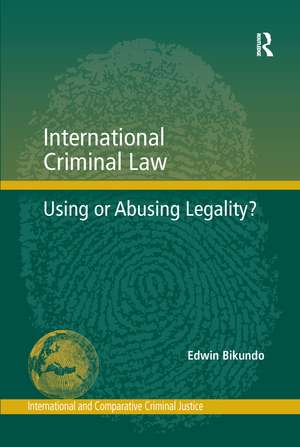International Criminal Law: Using or Abusing Legality?
Autor Edwin Bikundoen Limba Engleză Paperback – 9 sep 2016
| Toate formatele și edițiile | Preț | Express |
|---|---|---|
| Paperback (1) | 489.26 lei 6-8 săpt. | |
| Taylor & Francis – 9 sep 2016 | 489.26 lei 6-8 săpt. | |
| Hardback (1) | 1058.79 lei 6-8 săpt. | |
| Taylor & Francis – 28 mar 2014 | 1058.79 lei 6-8 săpt. |
Preț: 489.26 lei
Nou
Puncte Express: 734
Preț estimativ în valută:
93.63€ • 97.16$ • 78.26£
93.63€ • 97.16$ • 78.26£
Carte tipărită la comandă
Livrare economică 17-31 martie
Preluare comenzi: 021 569.72.76
Specificații
ISBN-13: 9781138246935
ISBN-10: 113824693X
Pagini: 222
Dimensiuni: 156 x 234 x 12 mm
Greutate: 0.45 kg
Ediția:1
Editura: Taylor & Francis
Colecția Routledge
Locul publicării:Oxford, United Kingdom
ISBN-10: 113824693X
Pagini: 222
Dimensiuni: 156 x 234 x 12 mm
Greutate: 0.45 kg
Ediția:1
Editura: Taylor & Francis
Colecția Routledge
Locul publicării:Oxford, United Kingdom
Notă biografică
Edwin Bikundo is a Lecturer at the School of Law at Griffith University in Brisbane, Australia. He has teaching and research interests in international and comparative law and critical legal theory. His current research focuses on the role of the international criminal trial in preventing the reoccurrence of violence.
Recenzii
’It is only on rare occasions that one comes across work in international criminal law combing social and political theory, legal analysis and specific case studies, all in the service of a general argument about law’s relation to violence. Bikundo offers unorthodox and refreshing perspectives on foundational issues and practical problems in international criminal law.’ Wouter Werner, VU University Amsterdam, The Netherlands ’This book provides an important theoretical, highly readable and nuanced study of the legality of international criminal law and its multiple relations with the violence of law. With considerable acumen, Bikundo reconstructs the possibility of critique and our understanding of the contemporary gestures of international justice.’ Peter D. Rush, University of Melbourne, Australia ’As denotes the material, Bikundo has an authorial presence at once secular and self-sacrificial, exemplary and human. The practical goal, and the sacrament in a world of immanent legality embraced as gift, is the matter of binding humanity’s violence through law. An intriguing, perplexing and wonderful book.’ Eugene McNamee, University of Ulster, UK
Cuprins
Table of Cases, Table of Legal Instruments, Preface, 1. The Responsibility to Protect Civilians from Political Violence: Locating Necessity between the Rule and its Exception, 2. International Criminal Law: From Hostis to Hostia Humani Generis, 3. Between Necessity and Contingency: Representing Legality as a Faustian Pact, 4. Global Law: From Force and Law to Aggression and Legality, 5. The Deficiencies of Law before Overwhelming Violence, 6. A Possible Methodology of Judicial Discourse in Marshalling, Interpreting, and Construing Aggression Clauses, 7. Exclusion and Inclusion: From Biopolitics to Biolegality, 8. Abuse of Legality: The Illegal Use of the Legal, 9. Reframing Criminal Aggression from Outside to Inside Law, 10. Legality and Resolving Ambiguity, References, Index
Descriere
This study is located within international law and seeks to determine whether prosecuting political violence would necessarily entail an abuse of the legal process. Issues discussed in the book are the controversies over the location of the crime of aggression in either law or politics and the legal approach to the problems outlined. Taking examples from Libya, the Ivory Coast and Kenya, the work is of interest to those working in the areas of international criminal justice, international law, legal theory, and international relations. .
